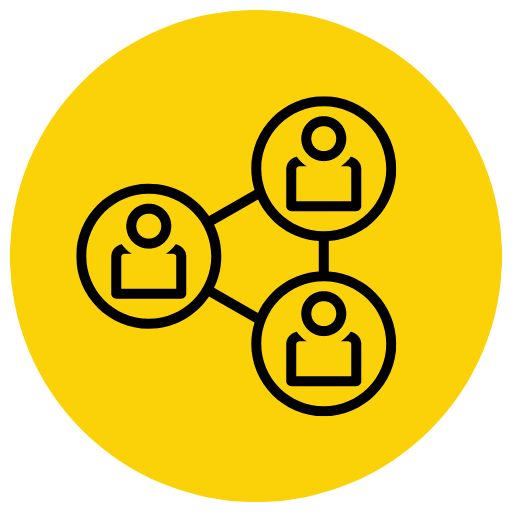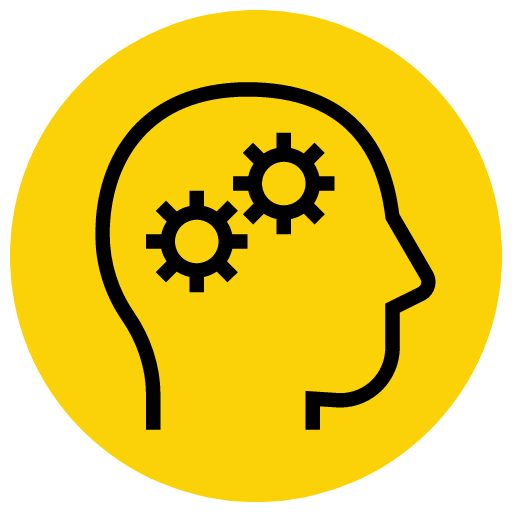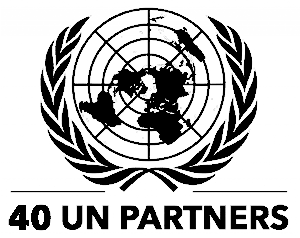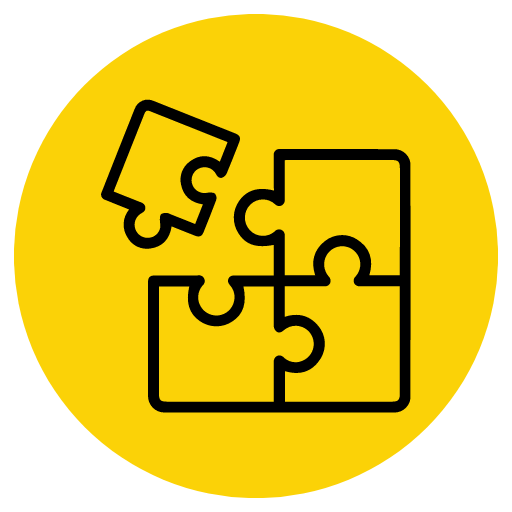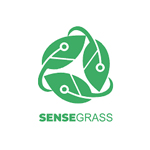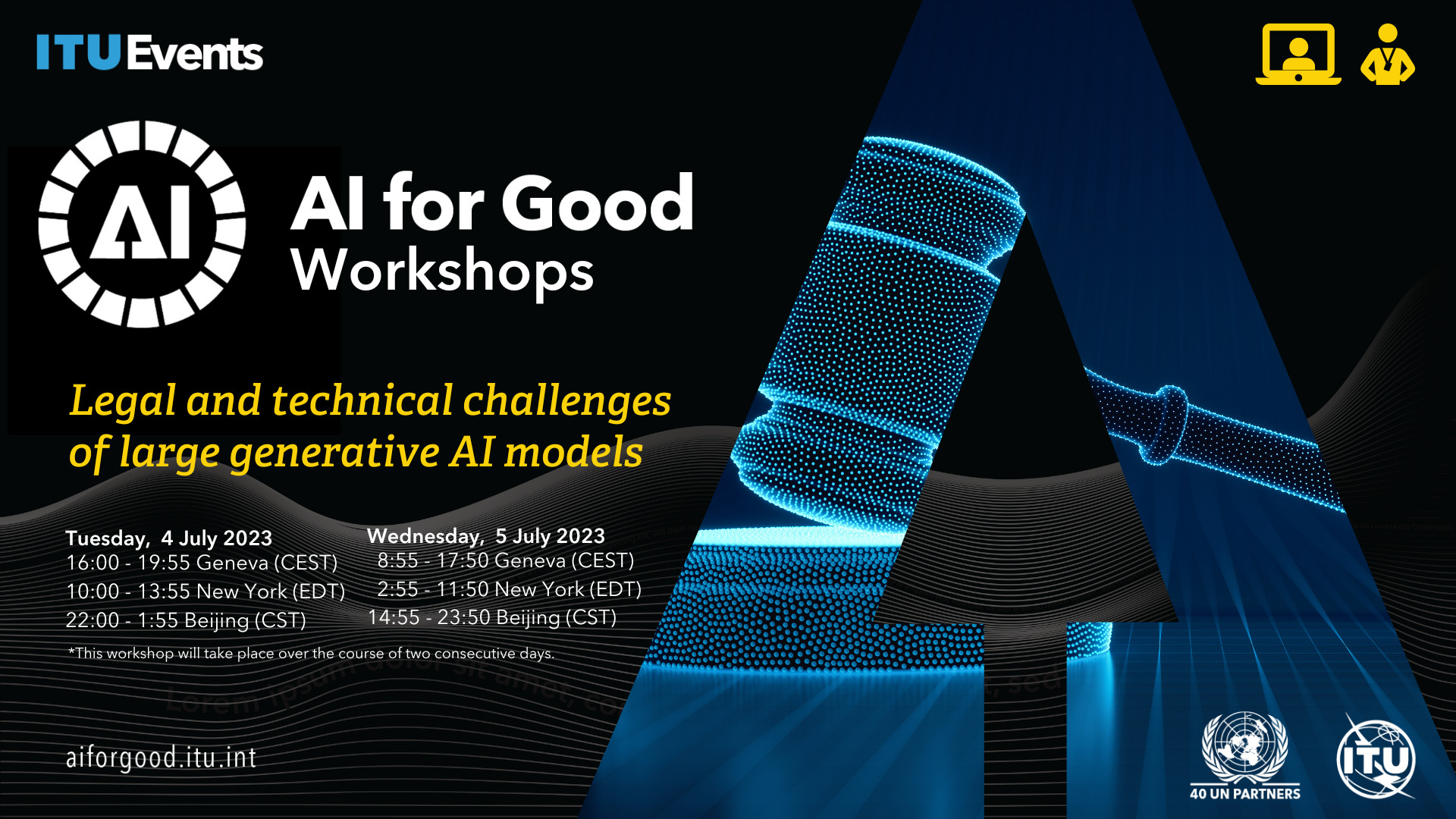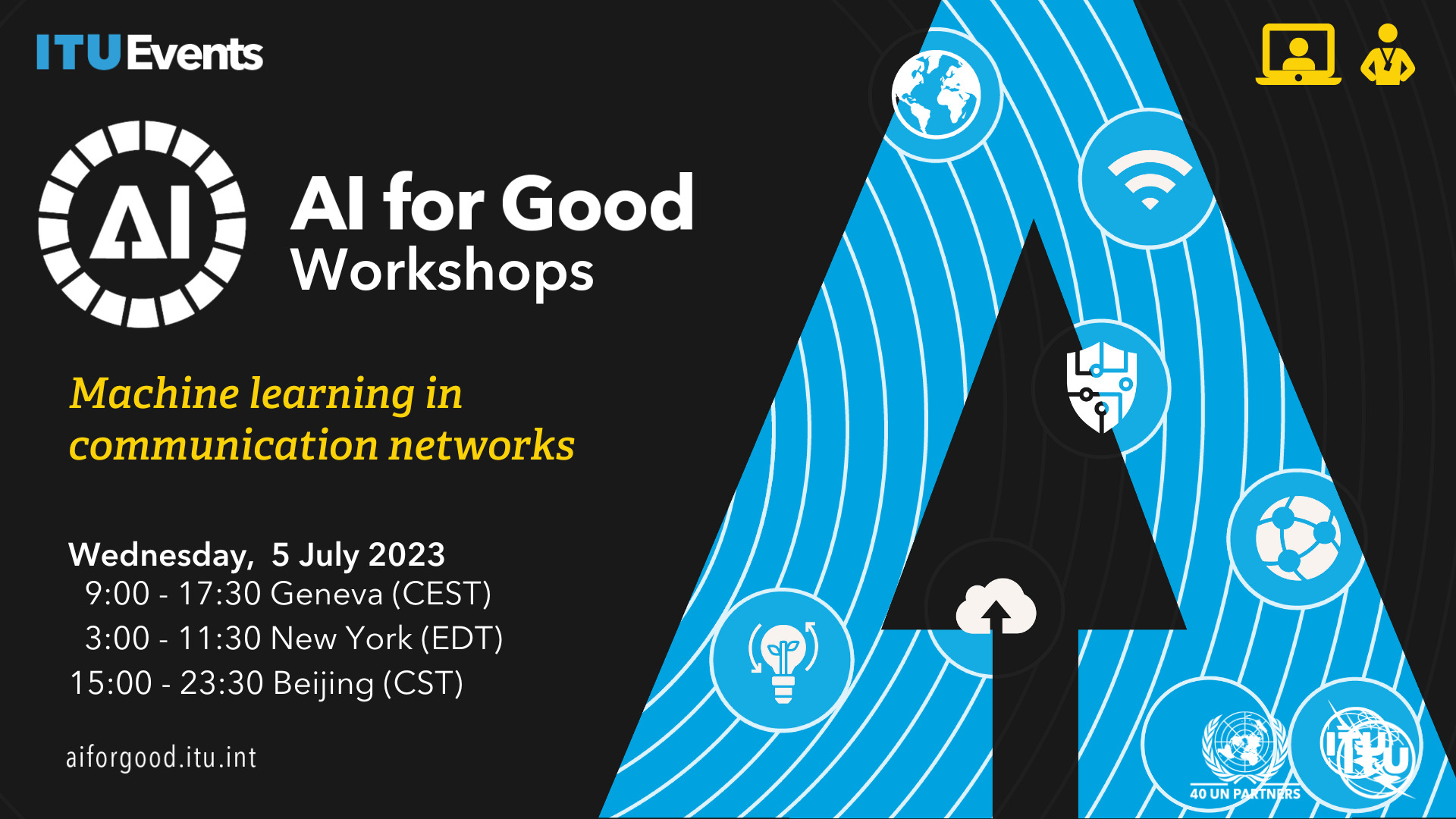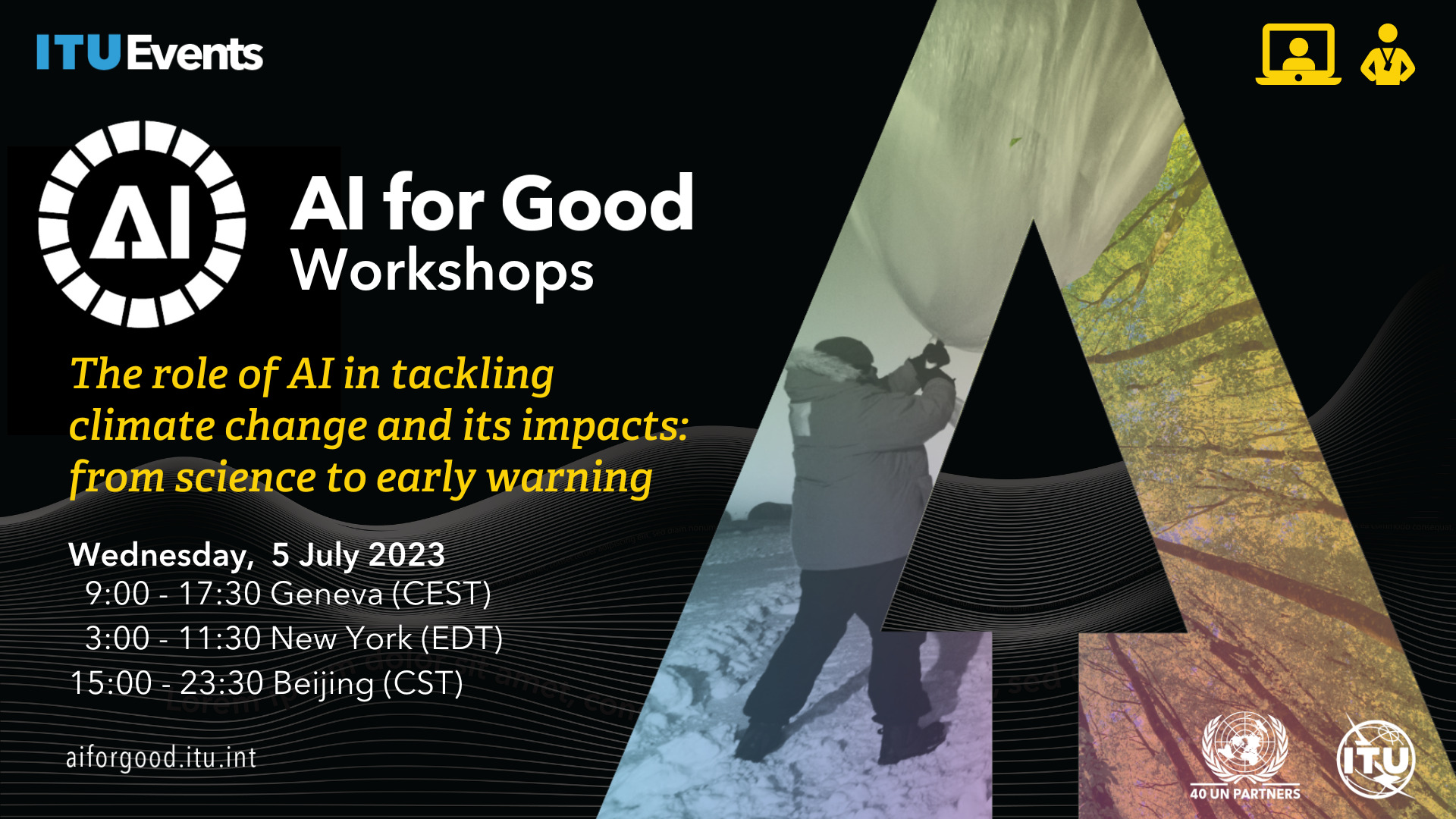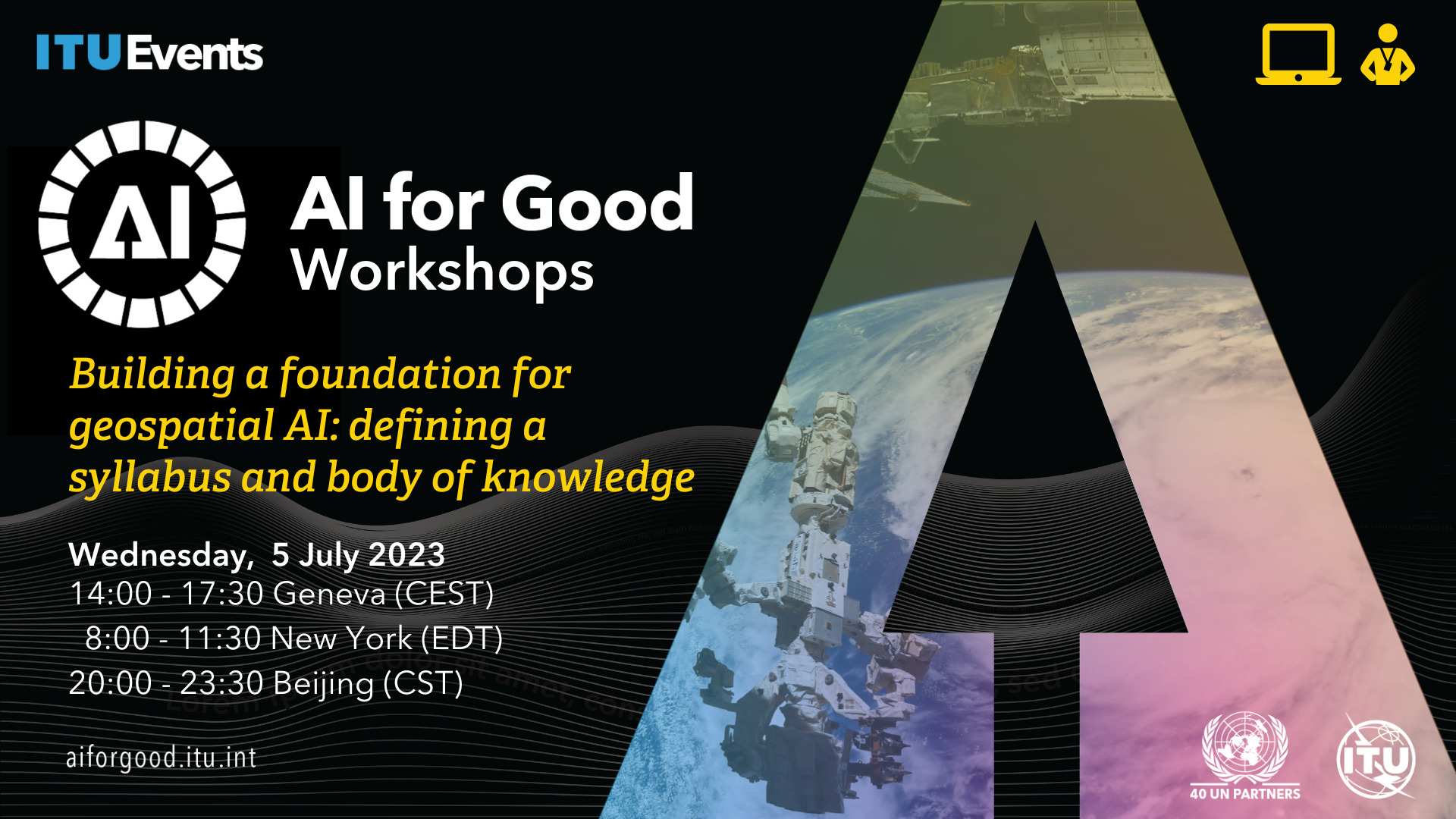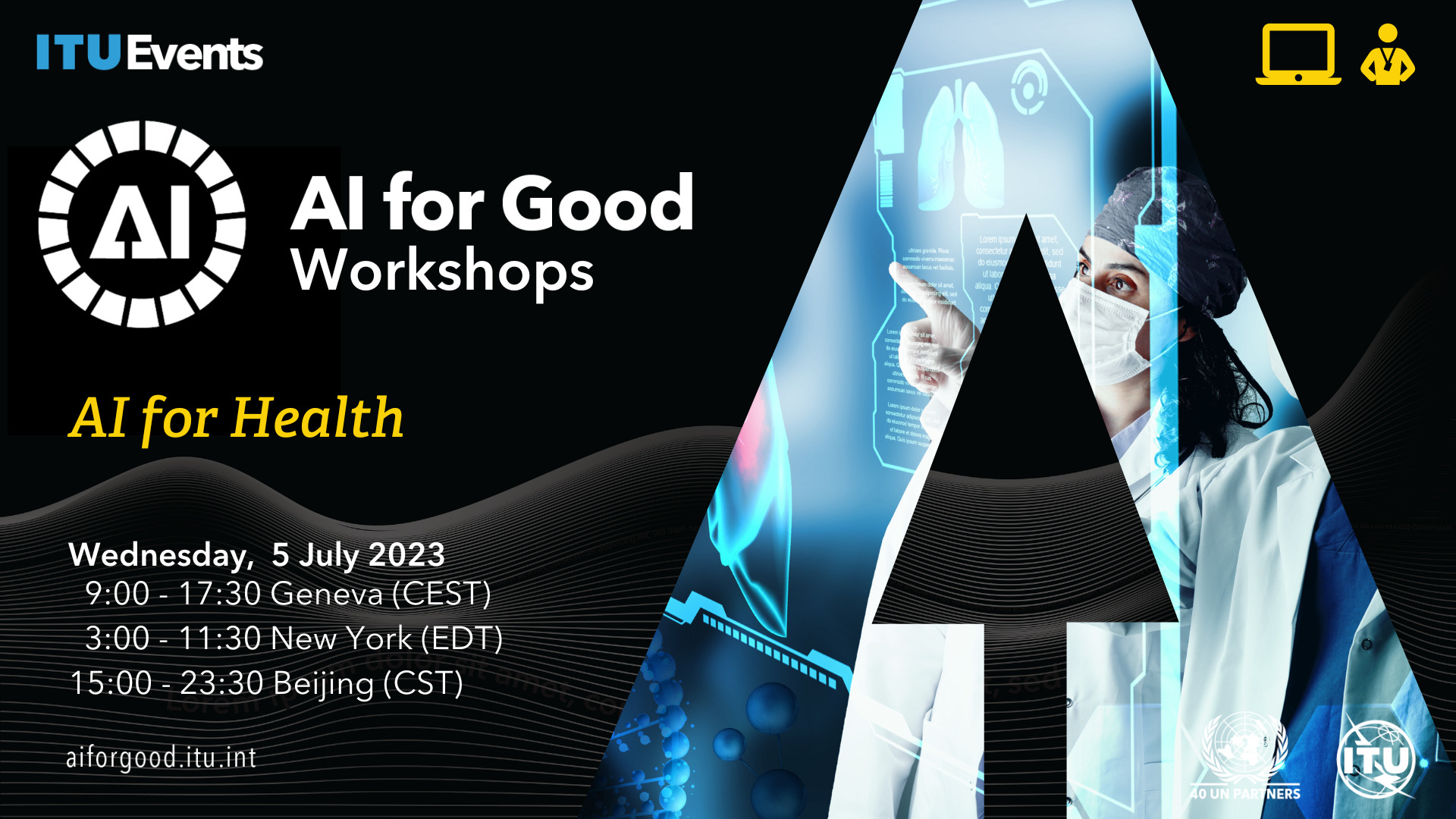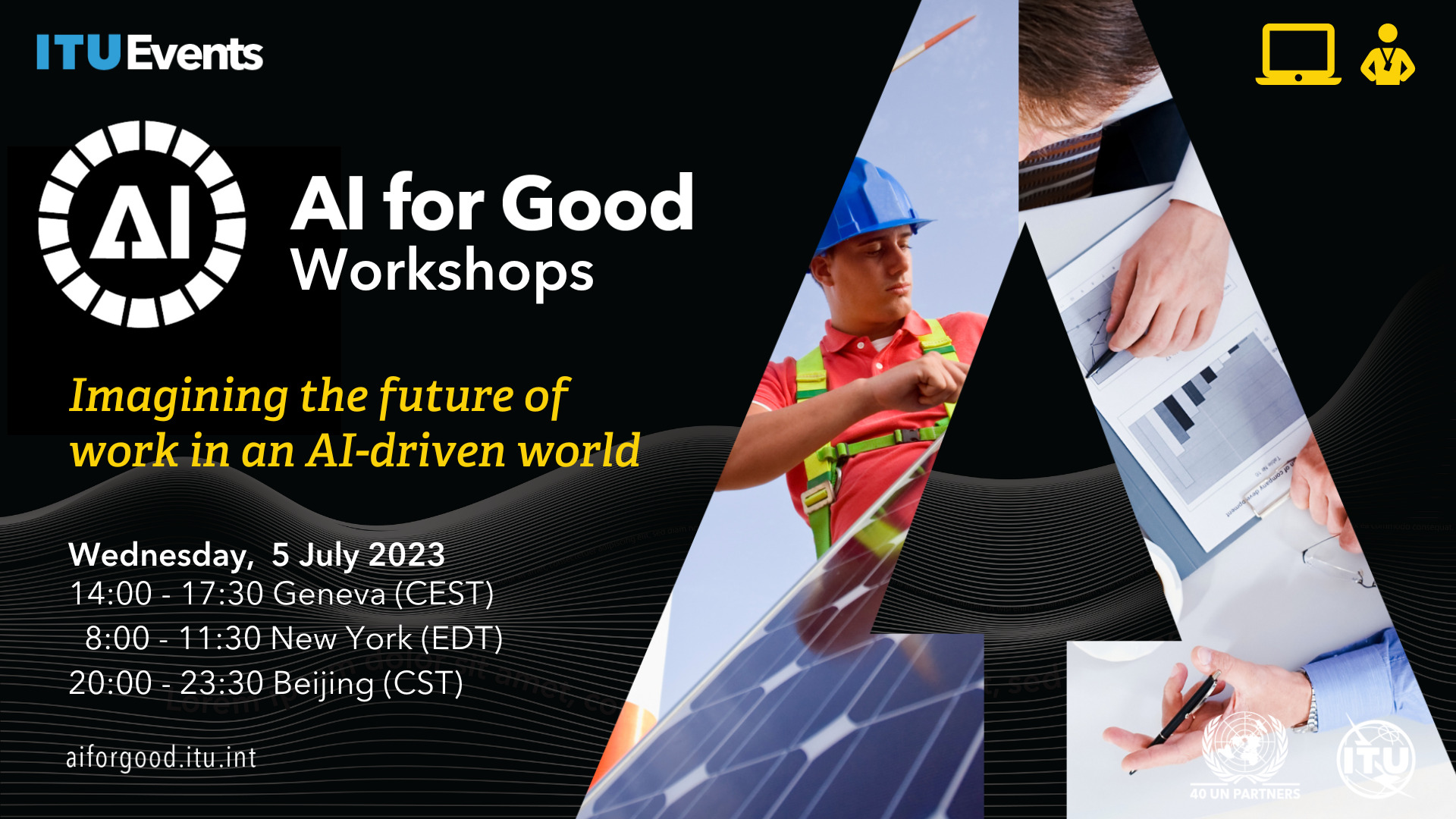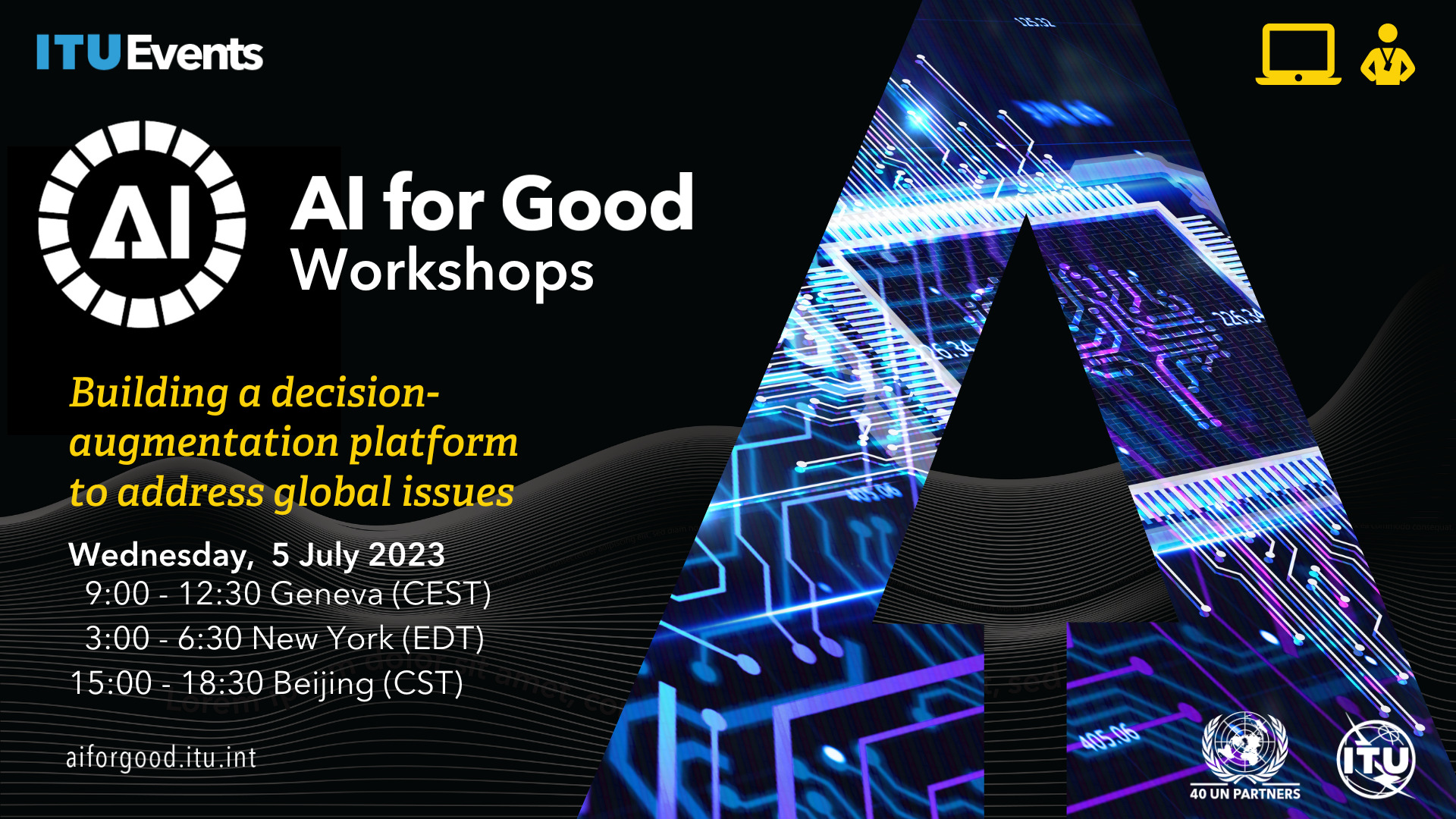Leader Pass Reception & Dinner - Wed, 5 July (19:30)
Leader Pass Reception & Dinner - Wed, 5 July (19:30)
AI inspired art, music and film presented in registration area and a warm welcome from Pepper the Robot, GoBe Robot, Aliengo, B1 and Go1. Discover cutting edge AI solutions from tech firms, start-ups, academics, and UN agencies and over 50 robotics demos in the exhibit area.
 08:15-08:30 CEST Geneva
08:15-08:30 CEST GenevaIndustrial robots and service robots require diverse manipulation skills. In this presentation, I will give an overview of the research challenges to teach new skills to these robots. It includes the development of intuitive interfaces to program the robots, the development of mathematical representations that can exploit the structure and geometry to represent robot movements, and the development of control techniques that can adapt to new situations and that can exploit task variations and perception uncertainties.
 08:30-08:45 CEST Geneva
08:30-08:45 CEST GenevaRobot(s):
- CultureInnovation & CreativitySpaceEnvironment & Climate Change
Setting the goals and shaping opportunities to identify high-potential AI solutions and generate AI for Good problem-solving opportunities to advance the United Nations Sustainable Development Goals.
 9:00 - 10:45 CEST Geneva
9:00 - 10:45 CEST Geneva 09:00 - 09:15 CEST Geneva
09:00 - 09:15 CEST GenevaInternationally acclaimed A.I. artist Harry Yeff uses AI to question the limit of his own voice, an opponent like duet and mentorship that pushes to new-voice and expression. Already among the best beatboxers in the world, Yeff’s lines of pursuit training with machines have pushed his capabilities into realms that truly begin to sound un-, non-, or posthuman. 'Machine Inspired Voice' is an ongoing research exploring multiple AI driven processes to develop new articulations, phraseologies, and compositions in human voice expression and true A.I. partnership.
Speaker(s)
 09:15 - 09:20 CEST Geneva
09:15 - 09:20 CEST Geneva 09:20 - 09:25 CEST Geneva
09:20 - 09:25 CEST Geneva 09:25 - 09:35 CEST Geneva
09:25 - 09:35 CEST Geneva 09:35 - 10:15 CEST Geneva
09:35 - 10:15 CEST GenevaIn this keynote, Dr. Werner Vogels will shed light on global applications of AI, through the lens of UN SDGs relating to climate, hunger and health. Dr. Vogels will share perspectives on the data and hardware underpinning today's AI technologies, and the benefits of democratized access. With a focus on the Global South and impact-native organizations, the talk will cut through the noise surrounding recent advances to look at the positive impact AI is making right now on society and environment. Acknowledging the need for continued stewardship and responsibility, Dr. Vogels will encourage increasing co-operation between government, industry, and enterprise. The keynote will end with a call-to-action for the audience - first find the data, then design the AI approach.
- FoodEnvironment & Climate changeRobotics for GoodHealthInclusivityDigital Economy
Connect with AI innovators and problem owners via the Robotics for Good Stage, SDG Stage, Discovery Networking Zone, and Leader Lounge Talks.
 10:45-11:30 CEST Geneva
10:45-11:30 CEST Geneva 10:50 - 11:05 CEST Geneva
10:50 - 11:05 CEST GenevaAs the effects of climate, conflict and economic shifts ripple across the world, there is a global hunger crisis. This session will focus on how cutting-edge AI applications help in emergency settings, but also enable farmers to access services thanks to AI.
Speaker(s)
 11:10 - 11:25 CEST Geneva
11:10 - 11:25 CEST GenevaUNEP presents the potential of AI to keep the environment under review and empower citizens and governments to act and respond to environmental risks, assess the current local and global situation of the environment, and predict future developments
 10:50-11:05 CEST Geneva
10:50-11:05 CEST Geneva 11:10-11:25 CEST Geneva
11:10-11:25 CEST GenevaEnvironmental sciences rely heavily on accurate, timely and complete data sets which are often collected manually at significant risks and costs. Robotics and mobile sensor networks can collect data more effectively and with higher spatial-temporal resolution compared to manual methods while benefiting from expanded operational envelopes and added data collection capabilities. In future, robotics and AI will be an indispensable tool for data collection in complex environments, enabling the digitalisation of forests, lakes, off-shore energy systems, cities and the polar environment. However, such future robot solutions will need to operate more flexibly, robustly and efficiently than they do today. This talk will present how animal-inspired robot design methods can integrate adaptive morphologies, functional materials and energy-efficient locomotion principles to enable this new class of environmental robotics. The talk will also include application examples, such as flying robots that can place sensors in forests, aerial-aquatic drones for autonomous water sampling, drones for aerial construction and repair, and impact-resilient drones for safe operations in underground and tunnel systems.
Robot(s):
 10:50 - 11:30 CEST Geneva
10:50 - 11:30 CEST GenevaProfessors Sarah Hammer (Wharton School, U Penn) and Philipp Hacker (ENS, European University Viadrina) will discuss the future of AI and AI regulation with a specific focus on generative AI, trustworthiness and sustainability. The session will feature interactive elements based on the following schedule:
- 5 min input statement Sarah Hammer: "The Future of AI: Lessons from AI for Good."
- 5 min input statement Philipp Hacker: “The Future of Generative AI Regulation: from Trustworthiness to Sustainability”
- Then open discussion with audience
Speaker(s)
 10:50 - 11:25 CEST Geneva
10:50 - 11:25 CEST GenevaImmerse yourself in an audio-visual adventure, traversing the rich history and future of AI in classical music and beyond. This session features diverse art-examples of automated music, including ancient automata musicians, and taps into the artistic journeys of David Cope and the AI-infused Beethoven X, leading up to visual story tellling by the AI-artist duo Cross Lucid and OPER AI, the first record label, showcasing exclusively music and artists created via Artificial Intelligence.Hosted by musician Jovanka v. Wilsdorf along with Sophia the robot, this musical journey delivers a fusion of original music and videos from renowned artists, exploring the magic of human-AI musical collaboration.
 10:50 - 11:05 CEST Geneva
10:50 - 11:05 CEST GenevaAchieving healthy and thriving communities is one of the global challenges facing our modern society. We are experiencing a rise in health conditions affecting people around the world with some of these conditions exacerbated by climate change, and its effect on major natural events, such as floods and bushfires. In addition, systemic social issues of inequality and disadvantage, pose a threat to the development of countries and communities globally. Creative and transformative responses are needed to address these issues and secure healthy, safe and inclusive communities locally, nationally and internationally.
The Monash Data Futures Institute fosters transnational, interdisciplinary collaborations in the applications of Artificial Intelligence (AI) and data science for good, bringing together leading cross-disciplinary expertise, international partnerships and one of the largest cohorts of AI and data science researchers in the Asia-Pacific.
In this talk, Prof Batstone will discuss flagship research in AI for Good led by the Monash Data Futures Institute, tackling global health and enabling the creation of thriving communities in Australia.
Moderator(s):
 11:10-11:25 CEST Geneva
11:10-11:25 CEST GenevaIn this presentation, we will explore the vital role of AI in driving and enabling digital transformation. With the great significance of digital transformation in today's business landscape, we will start by looking at the core concepts and drivers behind this transformative journey. Next, we will delve into why and how AI becomes the key to unlocking the full potential of digital transformation. We will discuss how AI empowers organizations to make data-driven decisions, enhance operational efficiency and productivity for verticals, and facilitate SDG goals at certain extent. We will also share our own practices to show how we integrate AI in our digital transformation endeavors.
Moderator(s):
- SpaceEnvironment & Climate changeRobotics for Good
 11:30-11:50 CEST Geneva
11:30-11:50 CEST GenevaIn this engaging talk, Moriba Jah will delve into the emerging field of machine-based detection, tracking, and monitoring of satellite operators in orbital space. With a primary focus on Privateer's innovative application, the International Telecommunication Union Compliance Assessment Monitor (ITU-CAM), this presentation aims to shed light on the assessment of compliance and non-compliance of satellite operators with ITU regulations.
The talk aims to inspire a collective understanding of the need for advanced technological solutions in monitoring satellite operators' compliance with ITU regulations. By embracing data-driven approaches and fostering collaboration, the global community can work towards a safer and more sustainable space environment.
Speaker(s)
 11:50 - 12:10 CEST Geneva
11:50 - 12:10 CEST GenevaThe integration of AI, networks of sensors and the data they produce hold the promise of transforming humanity’s relationship to, and governance of the planet. An age of unprecedented transparency and agility, in areas like climate, nature, food systems, trade and security, among many other areas, present new pathways toward more sustainable, accountable and inclusive futures. In this session, Planet’s Chief Impact Officer will explore some early “downpayments” on these planetary AI futures, and how we might ethically steward their emergence
 12:10 - 12:30 CEST Geneva
12:10 - 12:30 CEST GenevaNASA robots on Mars are achieving unprecedented results driven by systematic advances in autonomous capability. We’re at the cusp of launching a rocket from Mars with international collaboration. As the frontier expands there is likely to be sustained robotic presence on the Moon and Mars. This talk will highlight some of the opportunities and challenges for AI in space
- MetaverseEnvironment & Climate ChangeFoodRobotics for GoodHealth
 12:35 - 12:50 CEST Geneva
12:35 - 12:50 CEST GenevaA lot of small holder farmers are struggling with the direct effects of climate change to their activities. Secondly, they are unable to access climate data or to generate value off this data, that will equip their farming activities and allow them to respond to various climate effects. The AI Centre of Excellence proposes a solution that supports small scale farmers by generating insights on the agriculture ecosystem, climate monitoring and the real-time effects of climate conditions on agriculture and the possible recommendations.
 13:15 - 13:30 CEST Geneva
13:15 - 13:30 CEST GenevaAn educational non-profit - primarily led by youth leaders from low-income communities - will share the results of several 6-month pilots in which students and teachers in under-served public school districts were trained on how to create new “immersive and experiential” tools for learning in Virtual Reality, incorporating CHAT-GPT. Also an update on the “Metaverse for SDGs Global Prize & VR Competition” supported by the ITU with examples of youth team creations from Africa, Guatemala, Indonesia, the U.S. and Canada.
 13:30 - 13:45 CEST Geneva
13:30 - 13:45 CEST GenevaTechnology and innovation serve as a great global equalizer for those within the neurodivergent and autistic communities. Advances in AI aim to make the daily routine easier while also paving new ways of management, monitoring and diagnosis. It is an enormous growth area that addresses several of the United Nations's Sustainable Development Goals including Reducing Inequalities, Good Health and Well-Being, and Industry, Innovation, and Infrastructure.
Speaker(s)
 12:35 - 12:50 CEST Geneva
12:35 - 12:50 CEST GenevaSpeaker(s)
Robot(s):
 12:55-13:10 CEST Geneva
12:55-13:10 CEST GenevaNadine, the first robot to remember facts and emotions and having worked in insurances and elderly homes.
 13:10 -13:40 CEST Geneva
13:10 -13:40 CEST GenevaSpeaker(s)
 Cindy L. BethelProfessor and Director of the Social, Therapeutic & Robotic Systems Lab, Mississippi State University
Cindy L. BethelProfessor and Director of the Social, Therapeutic & Robotic Systems Lab, Mississippi State University Rodolphe HasselvanderCEO, Blue Frog Robotics
Rodolphe HasselvanderCEO, Blue Frog Robotics Shelly Levy-TzedekAssociate Professor and Director of the Cognition, Aging & Rehabilitation Laboratory, Ben Gurion University
Shelly Levy-TzedekAssociate Professor and Director of the Cognition, Aging & Rehabilitation Laboratory, Ben Gurion University Laura BoccanfusoCEO, Van Robotics
Laura BoccanfusoCEO, Van Robotics
Robot(s):
 13:45 - 13:55 CEST Geneva
13:45 - 13:55 CEST GenevaMiniaturization-based advances in electronics on planar and stiff substrates have revolutionized computing and communication during the last half century. However, several emerging applications and interactive systems (e.g., robots, wearables, and future vehicles, etc.) require intelligent sensors and electronics embedded in soft and squishy materials and in flexible form factors. These requirements call for new transformative methods to realize electronics on substrates such as plastic, paper and elastomers. This talk will present some of the recent technologies (e.g., the hybrid integration of the off-the-shelf electronics, printed micro/nanostructures-based CMOS electronics, and ultra-thin chips, etc.) and how they lead to tactile interfaces such as electronic skin for various intelligent interactive systems. Electronic skin is the key enabler for advances in emerging fields such as wearables, touch or haptics based augmented reality systems and healthcare technologies. This talk will discuss these future directions.
 12:30 - 13:55 CEST Geneva
12:30 - 13:55 CEST GenevaYouth of today have a unique perspective on the emergence of artificial intelligence (AI) and how it can shape the future. This intergenerational dialogue panel session, in collaboration with ITU’s youth initiative Generation Connect, will bring together participants from different generations, backgrounds and disciplines to bridge the divide between various perspectives on AI. The aim of the session is to foster a better and more inclusive understanding of the current and potential future impact of AI on young people in societies around the world. From discussing the disruption in education and career paths to the ethical implications of its use, this session will explore the considerable promise of the technology for young people as well as its risks.
Speaker(s)
 Karishma MuthukumarGraduate student, University of Cambridge
Karishma MuthukumarGraduate student, University of Cambridge Pratyush MuthukumarStudent, Stanford University
Pratyush MuthukumarStudent, Stanford University Siddhartha JhaAI and Digital Innovation Lead, Fondation Botnar
Siddhartha JhaAI and Digital Innovation Lead, Fondation Botnar Francois GreyAssociate professor & Director of the Geneva Tsinghua Initiative, University of Geneva
Francois GreyAssociate professor & Director of the Geneva Tsinghua Initiative, University of Geneva Valarie WaswaGeneration Connect Africa Youth Envoy
Valarie WaswaGeneration Connect Africa Youth Envoy Jennifer Gutierrez YañezGeneration Connect Americas Youth Envoy
Jennifer Gutierrez YañezGeneration Connect Americas Youth Envoy Amjad AlAmriMechanical Engineer and Senior Specialist, NEOM
Amjad AlAmriMechanical Engineer and Senior Specialist, NEOM Anka ReuelPh.D. Student, Stanford University
Anka ReuelPh.D. Student, Stanford University
Moderator(s):
 12:40-13:30 CEST Geneva
12:40-13:30 CEST GenevaWelcome to the musical world of Sophia, who will perform some of her songs together with Desdemona, Dianne Krouse on saxophone and our special guest Frankie Storm. You will also be taken through the AI music projects Jam Galaxy, the DIANA AI Song Contest, and SophiaPop, presented by Dianne Krouse, Jovanka v. Wilsdorf, and David Hanson.
Speaker(s)
 12:30 - 14:30 CEST Geneva
12:30 - 14:30 CEST GenevaInvitation only roundtable with 40 UN agency partners and other stakeholders, including AI ethics, innovation and governance experts, exploring innovative technical solutions and global governance frameworks designed to cultivate responsible use of AI and Robotics.
Speaker(s)
 Doreen Bogdan-MartinSecretary-General, International Telecommunication Union (ITU)
Doreen Bogdan-MartinSecretary-General, International Telecommunication Union (ITU) Amandeep Singh GillUnder-Secretary-General and Special Envoy for Digital and Emerging Technologies, Office for Digital and Emerging Technologies, United Nations
Amandeep Singh GillUnder-Secretary-General and Special Envoy for Digital and Emerging Technologies, Office for Digital and Emerging Technologies, United Nations Gabriela RamosMexico
Gabriela RamosMexico Robert OppChief Digital Officer, United Nations Development Programme (UNDP)
Robert OppChief Digital Officer, United Nations Development Programme (UNDP) Werner VogelsChief Technology Officer and Vice President, Amazon
Werner VogelsChief Technology Officer and Vice President, Amazon Lila IbrahimChief Operating Officer, Google DeepMind
Lila IbrahimChief Operating Officer, Google DeepMind Stuart RussellProfessor of Computer Science and Director of the Center for Human-Compatible AI, University of California, Berkeley
Stuart RussellProfessor of Computer Science and Director of the Center for Human-Compatible AI, University of California, Berkeley Ebtesam AlmazroueiExecutive Director of the Office of AI and Advanced Technology at the Department of Finance, CEO and Founder of AIE3, Chairperson of UN AI for Good Impact Initiative
Ebtesam AlmazroueiExecutive Director of the Office of AI and Advanced Technology at the Department of Finance, CEO and Founder of AIE3, Chairperson of UN AI for Good Impact Initiative Chris SharrockVice President, UN Affairs and International Organisations, Microsoft
Chris SharrockVice President, UN Affairs and International Organisations, Microsoft Gary MarcusScientist, best-selling author, and serial entrepreneur, New York University (NYU)
Gary MarcusScientist, best-selling author, and serial entrepreneur, New York University (NYU) Irakli BeridzeHead of Centre for Artificial Intelligence and Robotics, United Nations Interregional Crime and Justice Research Institute (UNICRI)
Irakli BeridzeHead of Centre for Artificial Intelligence and Robotics, United Nations Interregional Crime and Justice Research Institute (UNICRI) Robin GeissDirector, United Nations Institute for Disarmament Research (UNIDIR)
Robin GeissDirector, United Nations Institute for Disarmament Research (UNIDIR) Jay MahanandChief Information Officer and Director, Technology, World Food Programme (WFP)
Jay MahanandChief Information Officer and Director, Technology, World Food Programme (WFP) Najat MokhtarDeputy Director General and head of the Department of Nuclear Sciences and Applications, IAEA
Najat MokhtarDeputy Director General and head of the Department of Nuclear Sciences and Applications, IAEA Natalia BayonaExecutive Director, UNWTO
Natalia BayonaExecutive Director, UNWTO Rahim KananiDigital communications advisor, International Monetary Fund (IMF)
Rahim KananiDigital communications advisor, International Monetary Fund (IMF) Andrew AlspachChief of Information Management Branch, OCHA
Andrew AlspachChief of Information Management Branch, OCHA Ulrike TillDirector IP and Frontier Technologies Division, World Intellectual Property Organization (WIPO)
Ulrike TillDirector IP and Frontier Technologies Division, World Intellectual Property Organization (WIPO) Golestan Sally RadwanChief Digital Officer, United Nations Environment Programme (UNEP)
Golestan Sally RadwanChief Digital Officer, United Nations Environment Programme (UNEP) Chris LarssonChief Information Officer, UNICEF
Chris LarssonChief Information Officer, UNICEF Dmitry MariyasinDeputy Executive Secretary, United Nations Economic Commission for Europe (UNECE)
Dmitry MariyasinDeputy Executive Secretary, United Nations Economic Commission for Europe (UNECE) Ferran PerezExternal Affairs Officer, World Bank Group
Ferran PerezExternal Affairs Officer, World Bank Group Mary MahyDirector for Data for Impact, UNAIDS
Mary MahyDirector for Data for Impact, UNAIDS Ashraf ABUSHADYSenior Advisor for Digital Transformation and AI, United Nations Industrial Development Organization (UNIDO)
Ashraf ABUSHADYSenior Advisor for Digital Transformation and AI, United Nations Industrial Development Organization (UNIDO) Balthasar StaehelinSpecial Envoy for Foresight and Techplomacy of the Executive Office of the Director General, International Committee of the Red Cross (ICRC)
Balthasar StaehelinSpecial Envoy for Foresight and Techplomacy of the Executive Office of the Director General, International Committee of the Red Cross (ICRC) Dejan JakovljevicChief Information Officer (CIO), Director of Digital FAO and Agro-Informatics Division, Food and Agriculture Organization of the United Nations (FAO)
Dejan JakovljevicChief Information Officer (CIO), Director of Digital FAO and Agro-Informatics Division, Food and Agriculture Organization of the United Nations (FAO) Martin WählischAssociate Professor, Transformative Technologies, Innovation and Global Affairs, University of Birmingham, United Kingdom
Martin WählischAssociate Professor, Transformative Technologies, Innovation and Global Affairs, University of Birmingham, United Kingdom Serge StinckwichHead of Research, United Nations University
Serge StinckwichHead of Research, United Nations University Mounir TabetDeputy Executive Secretary, United Nations Economic and Social Commission for Western Asia (UNESCWA)
Mounir TabetDeputy Executive Secretary, United Nations Economic and Social Commission for Western Asia (UNESCWA) Pamela Coke-HamiltonExecutive Director, International Trade Centre (ITC)
Pamela Coke-HamiltonExecutive Director, International Trade Centre (ITC) Wendell WallachEmeritus Chair Technology and Ethics Research Group, Yale University Interdisciplinary Center for Bioethics, Yale University
Wendell WallachEmeritus Chair Technology and Ethics Research Group, Yale University Interdisciplinary Center for Bioethics, Yale University Serge ConesaFounder, Chairman & CEO , Immersion4
Serge ConesaFounder, Chairman & CEO , Immersion4 Charlene-Elise AndersonLeader - Intergovernmental Organisations and United Nations, Amazon Web Services (AWS)
Charlene-Elise AndersonLeader - Intergovernmental Organisations and United Nations, Amazon Web Services (AWS) Elena TomutaChief of Information Technologies, UNCTAD
Elena TomutaChief of Information Technologies, UNCTAD Mónica FerroDirector, Geneva Office UNFPA
Mónica FerroDirector, Geneva Office UNFPA Peggy HicksDirector of the Thematic Engagement, Special Procedures and Right to Development Division, Office of the United Nations High Commissioner for Human Rights (OHCHR)
Peggy HicksDirector of the Thematic Engagement, Special Procedures and Right to Development Division, Office of the United Nations High Commissioner for Human Rights (OHCHR) Antoine VellaChief of Data, Analytics and Statistics Section , UNODC
Antoine VellaChief of Data, Analytics and Statistics Section , UNODC Hovig EtyemezianHead ,Innovation Service, UNHCR
Hovig EtyemezianHead ,Innovation Service, UNHCR Irmgard NüblerSenior Economist, Interrnational Labour Organization Research Department
Irmgard NüblerSenior Economist, Interrnational Labour Organization Research Department Gayatri NemaliManager, ICT sub-division, United Nations Framework Convention on Climate Change
Gayatri NemaliManager, ICT sub-division, United Nations Framework Convention on Climate Change Sameer PujariLead AI for health, World Health Organization (WHO)
Sameer PujariLead AI for health, World Health Organization (WHO) Helene MolinierAdvisor, Digital Gender Equality Cooperation and Thematic Lead for GE Technology and Innovation, UN Women
Helene MolinierAdvisor, Digital Gender Equality Cooperation and Thematic Lead for GE Technology and Innovation, UN Women
 14:00 - 14:30 CEST Geneva
14:00 - 14:30 CEST GenevaSpeaker(s)
 14:30 - 15:15 CEST Geneva
14:30 - 15:15 CEST GenevaRobotics brings AI from the computer into the physical world. This panel session will explore and demonstrate some of the most promising directions of robotics for good, including socially assistive robots for individual development, recovery and wellness, robot dogs for comfort and support, robot medical assistants, expressive robots for human communication, and robot dogs that keep people safe in industrial settings and public safety operations. The panel will also cover the key issues of community acceptance, policy, and ethics.
Speaker(s)
 Ben GoertzelCEO and Founder, SingularityNET
Ben GoertzelCEO and Founder, SingularityNET Maja MatarićProfessor in the Computer Science Department, University of Southern California
Maja MatarićProfessor in the Computer Science Department, University of Southern California Will JacksonCEO and Founder at Engineered Arts, Engineered Arts
Will JacksonCEO and Founder at Engineered Arts, Engineered Arts Brendan SchulmanVice President of Policy and Government, Boston Dynamics
Brendan SchulmanVice President of Policy and Government, Boston Dynamics Cindy L. BethelProfessor and Director of the Social, Therapeutic & Robotic Systems Lab, Mississippi State University
Cindy L. BethelProfessor and Director of the Social, Therapeutic & Robotic Systems Lab, Mississippi State University
Robot(s):
- CultureInnovation & CreativityFoodInclusivitySmart Cities
 15:40-16:00 CEST Geneva
15:40-16:00 CEST GenevaThe human immune system is one of the most complex systems known to mankind, varying with age, gender, race, socio-economic class and disease/pathogen challenge. The Human Immunome Project is a global initiative to generate immunological baseline and functional data sets encompassing all such populations while providing AI tools that facilitate the translation of these data into new clinically relevant discoveries that advance global human health and lower economic burden. It will transform the way we understand and practice medicine in the next 10 years.
 15:20-15:35 CEST Geneva
15:20-15:35 CEST GenevaHow can we produce without consuming resources beyond our means? How can we be successful and fulfill our social and environmental responsibilities? Sustainability is one of the biggest challenges of our times. KUKAs technologies play an important role in this transformation – for example as a key element of ROPCA’s ARTHritis Ultrasound Robot (ARTHUR), the winner of the AI for Good Innovation Factory. A joint talk on how robot based solutions like these pay into the SDGs.
 15:40-15:55 CEST Geneva
15:40-15:55 CEST GenevaThe Digital Farmhand is low-cost electric robotic platform designed to help small-holder farmers with their on-farm production tasks. This talk will present the design and workings of the Digital Farmhand and field trials on various small-holder farmers in Australia and across the Indo-Pacific.
Robot(s):
 15:20-16:00 CEST Geneva
15:20-16:00 CEST GenevaIn this session, explore the power of AI in addressing climate and sustainability issues. Discover how artificial intelligence is revolutionizing early warning systems, empowering us to predict and mitigate the impacts of climate change. Join us as we delve into the latest research and practical applications that leverage AI to foster a sustainable future for our planet. Don’t miss this opportunity to be part of the conversation shaping positive change in the fight against climate change and its widespread impacts.
Speaker(s)
 15:25-15:55 CEST Geneva
15:25-15:55 CEST GenevaDelve into the vibrant world of pop artists using AI and their innovative approach to music production. Join us as we introduce Kathira and Sulfation among other emerging AI artists and take a look behind the production curtains of SophiaPOP and Found in Translation. Through snippets of original artist videos and engaging conversations, you will be taken through their creative process.
 15:20 - 15:35 CEST Geneva
15:20 - 15:35 CEST GenevaSince 2016, we have seen the rise of DATA becoming the 8th wonder of the world. Today, the way we are building the digital economy impacts all SDGs and is comprising all nations’ data and energy sovereignty. Going back to the fundamentals of physics laws using eco conservation, by all means enhanced by AI, is the natural path to “making the cloud cool again”.
Moderator(s):
 15:40 - 15:55 CEST Geneva
15:40 - 15:55 CEST GenevaMicrosoft aims to empower every person and every organization on the planet to achieve more with AI. Its AI strategy is based on innovation, trust, and responsibility, and it offers a comprehensive portfolio of AI products and services for developers and customers.
Moderator(s):
- Environment & Climate ChangeHealthPandemicDisaster Management
AI Innovators and Problem Owners pitch brand new AI for Good projects demonstrating significant potential to scale, in need of support, engagement and visibility of the international community.
 16:00 – 17:15 CEST Geneva
16:00 – 17:15 CEST Geneva 16:10 - 16:15 CEST Geneva
16:10 - 16:15 CEST Geneva 16:15 - 16:25 CEST Geneva
16:15 - 16:25 CEST GenevaSpeaker(s)
 Najat MokhtarDeputy Director General and head of the Department of Nuclear Sciences and Applications, IAEA
Najat MokhtarDeputy Director General and head of the Department of Nuclear Sciences and Applications, IAEA Tomas LamanauskasDeputy Secretary-General, International Telecommunication Union (ITU)
Tomas LamanauskasDeputy Secretary-General, International Telecommunication Union (ITU) Clare StarkUN Coordination Officer, Priority Africa and External Relations Sector, United Nations Educational, Scientific and Cultural Organization
Clare StarkUN Coordination Officer, Priority Africa and External Relations Sector, United Nations Educational, Scientific and Cultural Organization Rami AminProject Lead, World Bank Group
Rami AminProject Lead, World Bank Group Maria Antonia BrovelliProfessor, Politecnico di Milano
Maria Antonia BrovelliProfessor, Politecnico di Milano
 16:25 - 16:35 CEST Geneva
16:25 - 16:35 CEST GenevaDiscover the revolutionary impact of AI in detecting cardiovascular disease, and how to contribute to this life-saving cause through #donateyourheartbeats.
Speaker(s)
 16:35 - 16:45 CEST Geneva
16:35 - 16:45 CEST GenevaThe 2018 Global Summit created the ITU-WHO Focus Group on AI for Health. Five years later, join the leadership from ITU, WHO, and WIPO in launching its successor structure: the Global Initiative on AI for Health! The Initiative will build on the standards and code from the focus group with it's three pillar approach: Enable, Facilitate, Implement
Speaker(s)
 Doreen Bogdan-MartinSecretary-General, International Telecommunication Union (ITU)
Doreen Bogdan-MartinSecretary-General, International Telecommunication Union (ITU) Tedros Adhanom GhebreyesusDirector-General, World Health Organization (WHO)
Tedros Adhanom GhebreyesusDirector-General, World Health Organization (WHO) Thomas WiegandExecutive Director, Fraunhofer Heinrich Hertz Institute (HHI)
Thomas WiegandExecutive Director, Fraunhofer Heinrich Hertz Institute (HHI) Edward KwakwaAssistant Director General, Global Challenges and Partnerships Sector, World Intellectual Property Organization (WIPO)
Edward KwakwaAssistant Director General, Global Challenges and Partnerships Sector, World Intellectual Property Organization (WIPO)
 16:45 - 16:55 CEST Geneva
16:45 - 16:55 CEST GenevaA framework for collaboration on AI models to help decision making authorities and organizations tackle issues such as climate change, ecological disasters, disease control, water management, economic inequity, diversity and inclusion. Project Resilience allows for local Learnings, data agency, and model development and deployment in various communities, while harnessing the contributed AI systems into a greater globally applicable whole.
 16:55 - 17:00 CEST Geneva
16:55 - 17:00 CEST GenevaThere is a growing gap between the pace of rollout and the broad impact of generative AI – misleading and harmful content, concentration of power, abrupt shifts in labour markets – and the governance of these technologies for the common good. The Secretary-General has proposed a multi-stakeholder body to address these gaps. How can such a body assess risks and governance responses across jurisdictions and offer recommendations on aligning AI governance with human rights, the rule of law and the common good?
 17:00-17:15 CEST Geneva
17:00-17:15 CEST GenevaSpeaker(s)
 17:30 - 17:45 CEST Geneva
17:30 - 17:45 CEST GenevaCollaboration for blending art and science for a more sustainable world.
 20:15-21:00 CEST Geneva
20:15-21:00 CEST Geneva- Innovation & CreativityDigital Economy
 17:45 - 18:00 CEST Geneva
17:45 - 18:00 CEST Geneva 18:00 - 19:15 CEST Geneva
18:00 - 19:15 CEST GenevaAI for Good Innovation Factory is an UN-based startup pitching/acceleration platform to help start-ups grow and scale their innovative AI-powered and SDG-driven solutions, by providing them with opportunities of business matchmaking, mentoring, fundraising and more. The program is open to any innovative start-ups using artificial intelligence, machine learning, and advanced algorithms to achieve the UN Sustainable Development Goals. Through a series of preliminary pitching sessions this year, the best five teams have been selected to pitch their solutions at the Grand Finale during Ai for Good Global Summit on 6 July 2023. The event will connects the finalists with the world renowned AI experts and thought leaders to help scale their AI solutions globally.
Speaker(s)
 Seizo OnoeDirector of the Telecommunication Standardization Bureau (TSB), International Telecommunication Union (ITU)
Seizo OnoeDirector of the Telecommunication Standardization Bureau (TSB), International Telecommunication Union (ITU) Stephen IbarakiChairman & Managing General Partner, REDDS Capital
Stephen IbarakiChairman & Managing General Partner, REDDS Capital Carlo Tortora Brayda di BelvedereFounder and Chief Executive Officer, Cyber Eagle Project Inc.
Carlo Tortora Brayda di BelvedereFounder and Chief Executive Officer, Cyber Eagle Project Inc. Mostafa GadoVenture Developer, FoundersLane
Mostafa GadoVenture Developer, FoundersLane Adria DunnPhilantropist & Author, The Vine
Adria DunnPhilantropist & Author, The Vine
Startups:
 19:30 CEST Geneva
19:30 CEST Geneva

